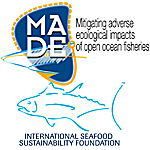Ecological risk assessment (ERA), and specifically Productivity-Susceptibility Analysis (PSA), is a useful methodology for assisting the management of fisheries from an ecosystem perspective in a data poor situation. Indian Ocean tuna and tuna-like fisheries, managed by the Indian Ocean Tuna Commission (IOTC), are economically important both at local and international scales and interact with several non-target or bycatch species. In spite of these interactions, no comprehensive ERA has been conducted for bycatch species caught by IOTC fisheries so far. We followed a two stage approach with the objective of assessing the relative risk of species being impacted by Indian Ocean tuna fisheries. An analysis of the available data from observer programs in the Indian Ocean (focused on bycatch species incidentally caught by major tuna fishing gears) revealed that most of these species are caught by longline fisheries, followed by gillnets and purse seines.
A PSA for the various longline and purse seine fleets operating in the Indian Ocean revealed two groups of species with high relative risk scores. The first one includes pelagic and coastal sharks, characterized by relatively low productivity, and the second one included teleosts, characterized by higher productivity but high susceptibility to purse seine and longline gears. Recognizing that IOTC community begins to pay more attention to shark conservation, the analysis suggests that sharks at higher risk may deserve more comprehensive scientific monitoring and management actions. Some alternative approaches to conduct PSA in the context of ERA are discussed.
- Presentation

 PDF version
PDF version
